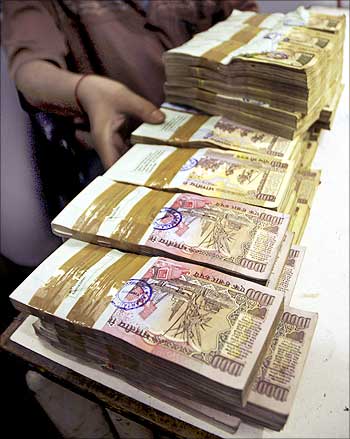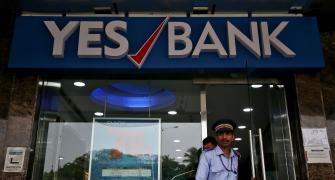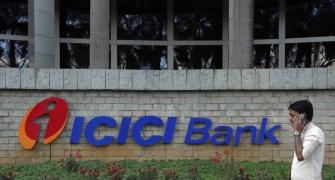 After National Spot Exchange Ltd (NSEL) this week suspended trading in forward contracts, the Forward Markets Commission (FMC), the commodities market regulator, on Friday sought to allay fears over the exchange defaulting on open contracts.
After National Spot Exchange Ltd (NSEL) this week suspended trading in forward contracts, the Forward Markets Commission (FMC), the commodities market regulator, on Friday sought to allay fears over the exchange defaulting on open contracts.
FMC Chairman Ramesh Abhishek said the exchange was very confident it would be able to honour all open-contract obligations. Late in the evening, NSEL filed its plan of action and settlement calendar with the regulator.
Investors, however, were not all that convinced, as shares of the listed group entities continued to bleed for a second day. The shares of Financial Technologies fell as much as 45 per cent on Friday but rebounded from the lows of Rs 105 to close 21.1 per cent lower at Rs 151.25, thanks to short covering.
This was after a 65 per cent decline the previous day. Another group company, MCX, hit the 20-per-cent lower circuit — for a second straight day — to close at Rs 409.65.
The Securities and Exchange Board of India (Sebi), meanwhile, sought details from various brokers about their direct and indirect exposure to NSEL. The market regulator wants brokers to ensure their exposure to NSEL is secured with sufficient collateral and that any problem on that front does not affect their liquidity position for brokerage operations in equity, currency and other segments.
Sebi Chairman U K Sinha said there was no risk to the securities markets and all payouts and pay-ins were happening. He said the regulator was coordinating with FMC and the government on a regular basis and Sebi was on top of the situation.
Brokerages said chances of the payment crisis spreading were limited. A fifth of the Rs 5,500 crore locked in the NSEL debacle belongs to the clients of four large brokerages — India Infoline (Rs 250 crore), Motilal Oswal Financial Services (Rs 250 crore), Anand Rathi (Rs 300 crore) and Geojit Comtrade (Rs 300 crore).
Sources suggested that a large number of clients traded on the exchange after they were pitched an arbitrage product with expected returns of close to 15 per cent, said to be virtually risk-free. However, brokers maintained this did not place any obligation on them.
“The broker is an intermediary… all the payment is to be made by the exchange to the client,” said Pradeep Gupta, vice-chairman, Anand Rathi.
“We are hopeful of a settlement soon. There is no obligation on the broker, who earns a small commission from the transaction,” India Infoline Managing Director R Venkataraman.
“There was no guarantee. Returns were calculated on the basis of possible arbitrage opportunities, such as the difference between cash and futures price,” said Motilal Oswal Financial Services CMD Motilal Oswal.
“This is not a panic situation. The regulators are monitoring the situation and we are sure there will be an orderly situation,” said C P Krishnan, whole-time director, Geojit Comtrade.
A major crisis had erupted at NSEL on Thursday after it suspended most trades on its platform the day before, prompting the government to order an FMC enquiry, while Sebi also began a separate probe amid a crash in shares of the two listed group companies.
Many market intermediaries said the sudden spike in NSEL’s turnover volumes from 2009 should have made regulators sit up and take notice immediately. But it took three years to plug a regulatory loophole that allowed high net worth individuals (HNIs) to cash in on the spot commodities market.
The exchange, which is a platform for physical buying and selling of agri commodities and metals, had an annual turnover of Rs 28 crore (Rs 280 million) in 2008. But, over the past three years, as equities muddled along, HNIs saw a window of opportunity the exchange offered - of buying commodities, primarily agri commodities from sellers at a lower price and selling back at the end of a 24- or 36-day period at a higher price.
The buying and selling price were visible on the same screen, so there was technically no wrongdoing.
Brokers, which were selling this as a product, said this was never part of their portfolio, as commodities were not permitted by Sebi under portfolio management services.
This new window of opportunity pushed up NSEL’s annual turnover to Rs 318,000 crore (Rs 3.18 trillion) in 2012. The split was nearly 50:50 between agricultural and metal commodities.
As the turnover spiked, the consumer affairs ministry stepped in to check the speculation in agri commodities, as these contracts appeared to resemble forward contracts, where delivery was not being taken.
NSEL on July 23 issued a circular that reduced the delivery, payment and settlement period of all contracts traded on the exchange to less than 11 days (T 10) and withdrew the intra-day square-off facility. However, the market could not adjust to this change and problems started surfacing. The thinking at the exchange was, by doing so, it had implemented what the ministry wanted. The government, however, took exception and sent a letter, saying contracts should be settled on maturity and no fresh contracts should be launched. It also took serious note of the suspension of trading.








